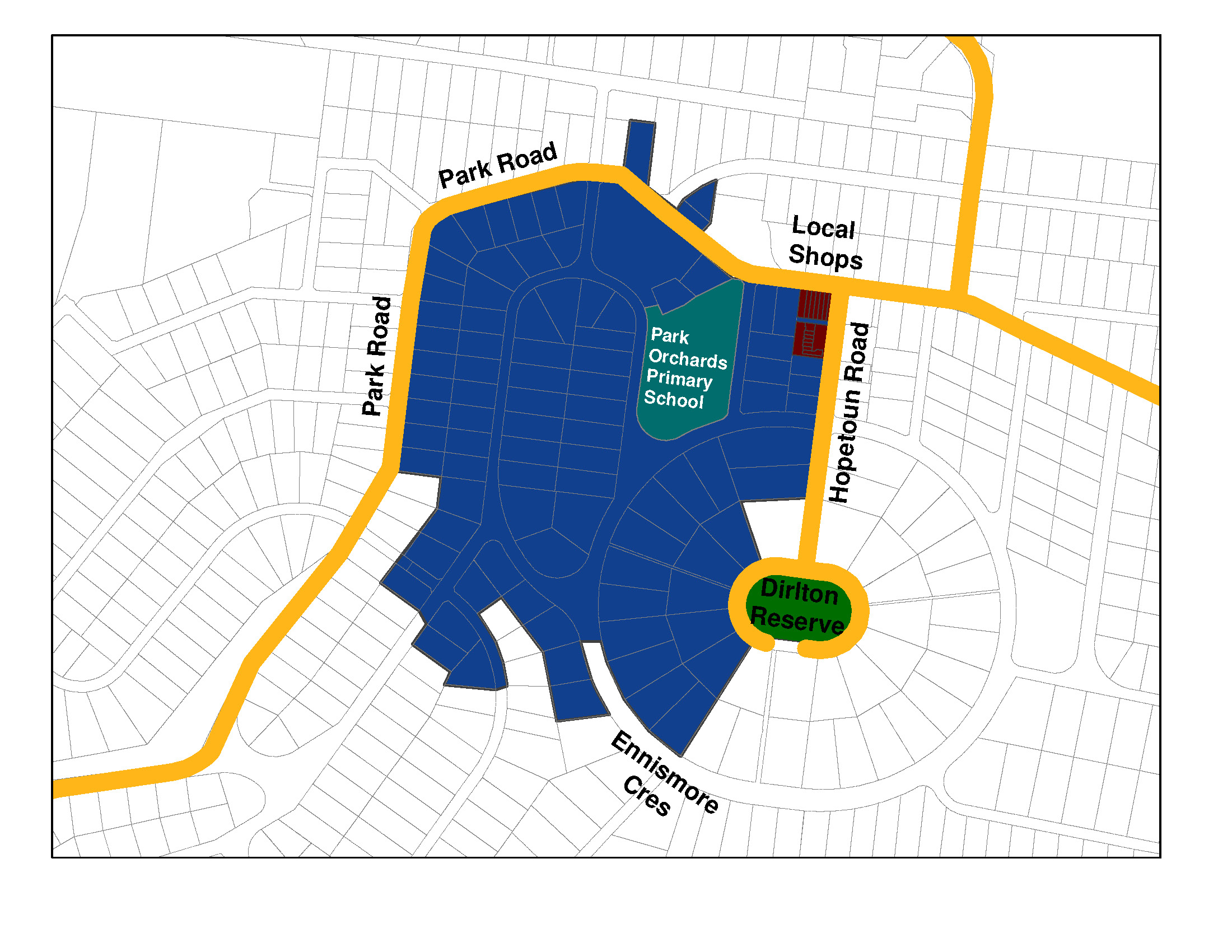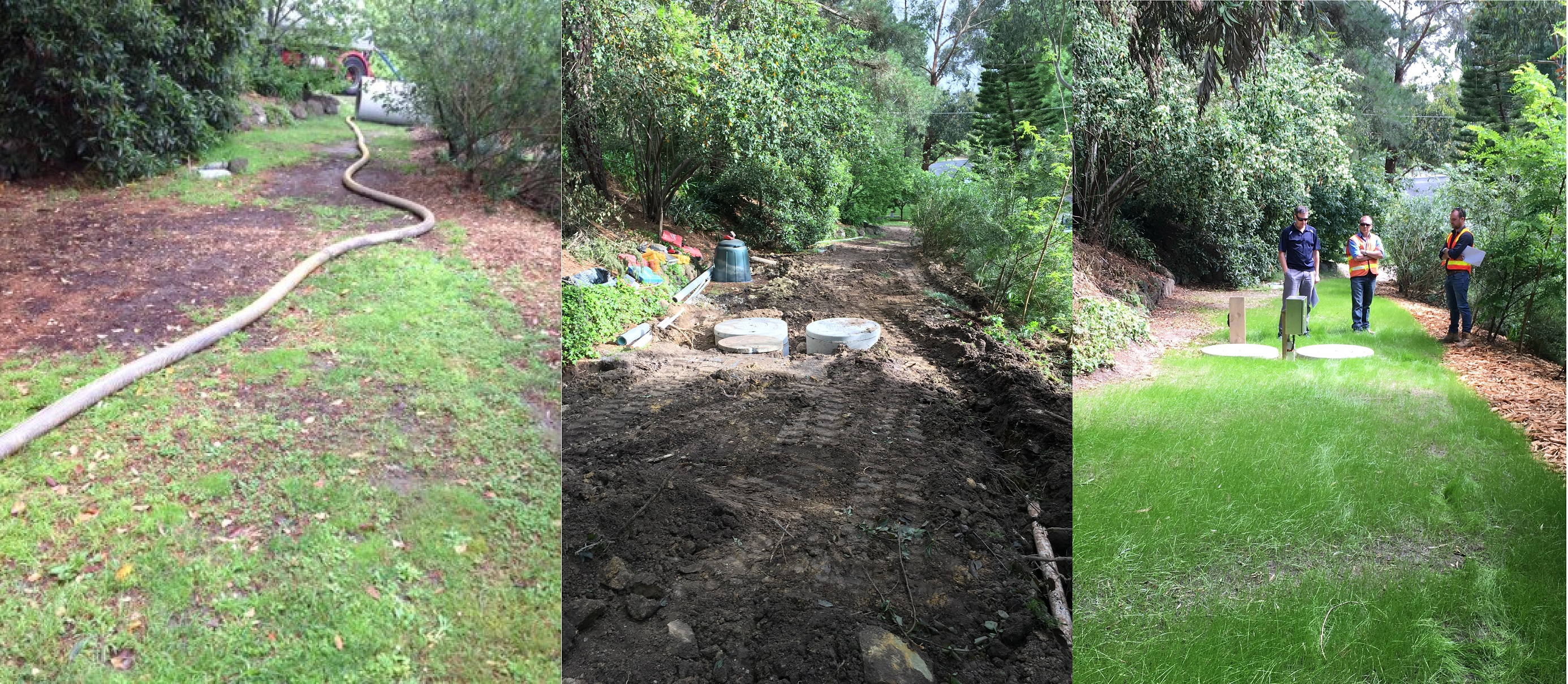Park Orchards community sewerage trial
Contact
Insight:
Project description
As part of one of the delivery projects of the Park Orchards and Ringwood North Community Sewerage Area, a trial area of 100 properties in the Park Orchards area has been selected to test and understand the potential to maximise the use of on-property treatment and application of wastewater within the local community. Technologies under evaluation include the use of upgraded on-site septic systems, with irrigation where possible, and the construction of a sewer network for remaining properties that cannot contain their wastewater on-site. It is intended that the outcomes of this trial will inform the provision of a fit-for-purpose sewerage system for the broader Park Orchards Community Sewerage area, encompassing over 1,200 properties in both Park Orchards and Ringwood North. The servicing approach used could include installing a reticulated sewerage network, installing on-site systems or a combination of both.
Map showing Park Orchards Trial Area

The drivers
Improve waterway and public health, and public amenity by providing a fit-for-purpose sewerage solution
- Reduce excess nutrients entering waterways, and address unpleasant odours and soggy backyards as a result of poorly performing septic systems.
- Gain an improved understanding of alternative wastewater management options.
- Understand community perceptions around sewerage servicing options, and ensure these are considered in Yarra Valley Water's decision-making process.
- Obtain feedback and guidance from the community to assist in the delivery of the trial.
- Monitor and evaluate the performance of the trialled technologies across a range of social, financial, environmental variables and health of the local environment, to confirm assumptions and inform a broader wastewater management strategy for the Park Orchards and Ringwood North Community Sewerage area.
The innovations
Maximise the use of on-property wastewater treatment in a sustainable manner
- New insights into wastewater management opportunities: The initial findings from the design phase of the trial indicate there is potential to maximise the application of treated wastewater on most of the properties in the trial area. Installing these technologies in the trial area will allow these early findings to be further tested. The trial will also evaluate the potential for the current on-site septic system supplier market to deliver such an approach, and evaluate the differing system brands in the marketplace.
- Servicing approach to properties unable to contain wastewater on-site: For the small proportion of properties (approximately 15%) unable to manage their wastewater on-site, an alternative solution was required. Two main sewerage servicing options were shortlisted: the installation of a local wastewater treatment plant, or connection of the properties to Melbourne’s existing sewerage system. The connection to the existing sewerage network was the preferred option for Yarra Valley Water and the local community, because it is less expensive, simpler to operate and maintain, resulted in fewer overall risks to delivery and resulted in greater flexibility for residents in the area. However, there was also a strong desire by the community to maximise on-site containment so opportunities will be sought to maximise irrigation on these properties where possible.
- Monitoring on-site system performance to inform future investments: Five different on-site septic systems have been used in the trial upgrades, including a new on-site septic system currently under development by Yarra Valley Water. These systems will be monitored over a two-year period to assess performance, cost, benefits and challenges. The outcomes of this monitoring will help to identify the preferred technologies to use as part of developing a preferred alternative on-site technology for Yarra Valley Water to consider.
- Community engagement: This trial was suggested by Yarra Valley Water in response to community feedback highlighting a strong community opinion to explore the use of on-site wastewater treatment systems. The Park Orchards Trial Community Engagement Panel (POTCEP) has been operating since 2013 to allow interested customers and community groups to proactively provide feedback on the trial and the corresponding communication strategy with residents.
The lessons
- Ongoing relationship building with stakeholders is positive: The trial was understood from the onset to likely raise numerous regulatory, accountability and legislative uncertainties. To address these uncertainties, Yarra Valley Water proactively developed a Memorandum of Understanding (MoU) with key stakeholders including the local council, EPA Victoria, the Department of Environment, Land, Water and Planning and Melbourne Water. The MoU provided a framework to allow authorities to clarify their intentions with the trial and outlined an agreed methodology for resolving uncertainties.
- Combination of solutions required: Most of the properties in the Park Orchards area will be able to contain their wastewater on-site, because they have suitable area available for treatment and reuse (irrigation). However, an alternative option was required to service the small number of properties without this area available (e.g. shopping precinct and some residential properties). The trial is helping to determine how such sewerage technologies are best integrated to transition properties from an on-site approach to a reticulated sewerage service.
- Community engagement identifies broader concerns: Using an online forum, residents of properties unable to contain wastewater on-site provided feedback on the two alternative solutions. As well as voting on the preferred option, the community also sent through comments and concerns outside of these two options. Yarra Valley Water addressed responses in follow-up materials and used the feedback in its conceptualisation of the on-site servicing strategy. This proactive approach to gauging community views assisted Yarra Valley Water in incorporating this information into the design of the works.
Transferability
Before, during and after septic system replacement

Project stats
Location
Park Orchards and Ringwood North, VIC, Australia
Participants
Awards
New Zealand Land Treatment Collective (NZLTC) Annual Conference Best Overall Paper for conference paper titled “Baseline and verification monitoring from Yarra Valley Water’s on-site wastewater management trial”.
Additional information
Contact
The outcomes
 Cities providing ecosystem services
Cities providing ecosystem services

- Improved waterway health: Fewer nutrients are entering downstream waterways.
 Cities as water supply catchments
Cities as water supply catchments

- Local use of water: Wastewater will be treated on-site and used for irrigation.
- Testing innovative solutions: Five different on-site technologies will be trialled to inform future investment across the Park Orchards area.
- Development of a new on-site system: The new on-site system has potential for use within the industry to reduce ongoing maintenance and electricity consumption.
 Cities comprising water sensitive communities
Cities comprising water sensitive communities

- Engaged community: The community has been proactively involved and informs the decision-making process through a community panel and online forums.
- On-site solutions: Approximately 85% of the properties in the trial area are able to contain wastewater on site.
Business Case
| Costs* | Benefits |
|
|
* These are preliminary costs incorporating the cost of maximising the use of on-site systems as well as reticulated sewer for properties where on-site containment is not possible for the 1,250 lot service area.
Interested in this solution?
We partner with small and large companies, government and industry in Australia and around the world.
Comments